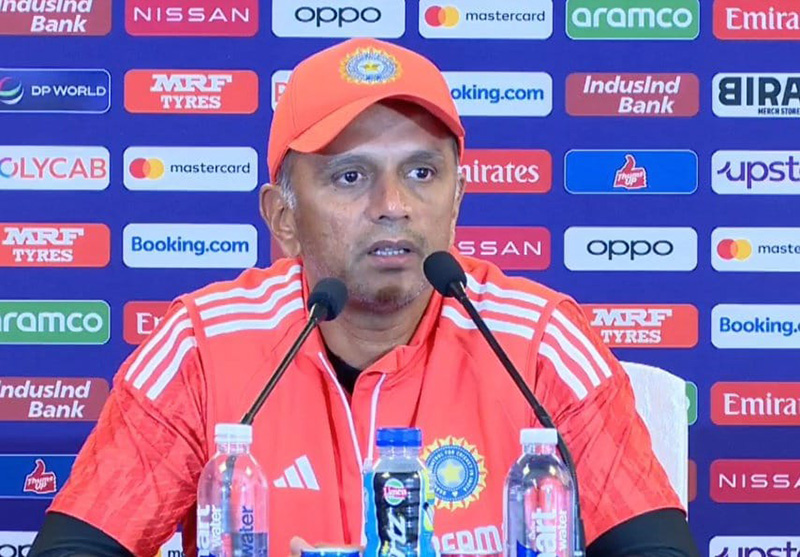
The Indian cricket team’s unexpected exit from the ICC World Cup 2023 sent ripples of shock and introspection throughout the cricketing world and beyond. This event, steeped in high emotions and analyses, provides a unique opportunity to understand and reflect upon the concept of Karma, especially in the context of sports and collective effort.
Understanding the Debacle through the Lens of Karma
Karma, a principle deeply rooted in various Eastern philosophies, is often simplified as the law of cause and effect. In the context of cricket, or any team sport, the performance and outcome are not just the result of actions taken during the game but are also influenced by the cumulative efforts, attitudes, and decisions made in the lead-up to the event. The Indian team’s journey in the World Cup was a tapestry woven from individual and collective actions, strategies, and perhaps, a dose of destiny.
Leadership and Karma: Lessons from Rahul Dravid

Rahul Dravid, the esteemed coach of the Indian team during the World Cup, embodied the essence of Karma through his approach to leadership. When the team faced defeat, he didn’t shy away from taking responsibility, a gesture reflecting the concept that one must own their actions and their consequences. Conversely, in times of success, he ensured the limelight was shared among the players, resonating with the karmic philosophy of humility and collective credit. During the post-match press conference, Dravid said, “Yeah, of course he’s disappointed, as are many of the boys in the dressing room. It wasn’t, yeah, there was a lot of emotions in that dressing room. It was tough to see as a coach, because I know how hard these guys have worked, what they’ve put in, the sacrifices they’ve made. So, it’s tough. I mean, it’s tough to see that as a coach, because you get to know these boys personally. You get to see the effort they put in, the hard work that we’ve put in over the last month, the kind of cricket we’ve played. But yeah, but that’s sport. That happens. It can happen. And the better team won on the day. And I’m sure that the sun will come up tomorrow morning. We’ll learn from it. We’ll reflect. And we’ll move on, as will everyone else. I mean, that’s what you do as sportsmen. You have some great highs in sport, and you have some lows in sport. And you keep moving on. You don’t stop. Because if you don’t put yourself on the line, you don’t put yourself in games like these, you don’t experience the great highs. And neither do you experience the great lows. And if you don’t do that, you don’t learn.,”
Quintessentially, Rahul Dravid reminds us of the visionary leader Abdul Kalam, who famously said, ‘When failure occurs, a leader should humbly own it and acknowledge it. When success comes, the leader should again have the humility to give credit to all the people who worked for it.
The Karmic Cycle in Sports

In sports, as in life, the karmic cycle is evident. Every decision, training session, strategy, and even thoughts of players and coaches contribute to the eventual outcome. While skills and strategies are paramount, the mental and emotional states of players, influenced by their past experiences and future expectations, also play a significant role. The Indian team’s experience in the World Cup was a reminder that success and failure are both transient and should be approached with a balanced perspective.
The Broader Implications of Karma
The teachings of Lord Krishna, Buddha, and Jesus Christ emphasize actions performed without attachment to outcomes. This principle, when applied to sports, underscores the importance of playing the game with dedication and effort, without being overly fixated on winning or losing. It encourages athletes and teams to focus on the process, the present moment, and playing to the best of their abilities, leaving the outcome to unfold as it may. In Bhagavath Geeta, Lord Krishna has aptly said,
न मे पार्थास्ति कर्तव्यं त्रिषु लोकेषु किञ्चन |
नानवाप्तमवाप्तव्यं वर्त एव च कर्मणि || 3:22||
na me pārthāsti kartavyaṁ triṣhu lokeṣhu kiñchana
nānavāptam avāptavyaṁ varta eva cha karmaṇi
3. 22: There is no duty for Me to do in all the three worlds, O Parth, nor do I have anything to gain or attain. Yet, I am engaged in prescribed duties.

The Indian cricket team’s experience in the ICC World Cup 2023 serves as a powerful illustration of the complexities of Karma. It highlights that in sports, as in life, outcomes are not solely determined by immediate actions but are the result of a myriad of factors, many of which are beyond direct control. This perspective encourages a more holistic approach to competition, emphasizing effort, learning, and growth over the singular goal of victory. As we reflect on the Indian team’s journey, it becomes clear that understanding and embracing the essence of Karma can lead to a deeper appreciation of sports and life’s unpredictability, teaching us resilience, humility, and the value of perseverance.
Prahlada N. B
21 November 2023
Chitradurga.

















Prahlada Sir 💐
KARMA essentially means ….
“ One should inculcate dedication in work, with no expectation of reward “.
This philosophy forms the basis for ‘four’ guiding principles :
* Right attitude to work ,
Right motivation,
Give up result &
Serve the self…..in all *
All above has been done by our lndia Cricket team, under the able guidance of dedicated coach, ‘Rahul Dravid’ ….who is an epitome of decency, perseverance & humbleness.
So, though our ‘Team India’ has given it’s best ….. the final result ……was not expected !
ReplyThis in essence, is called Karma !!
One end-failure camouflaged the previous great matches. Overall credit should go to Indian team for their performance. On that particular day they were unlucky
ReplyCricket is a game of glorious uncertainites often Sometimes decided by coin(fate) & Weather sply with dew&pitch
Reply